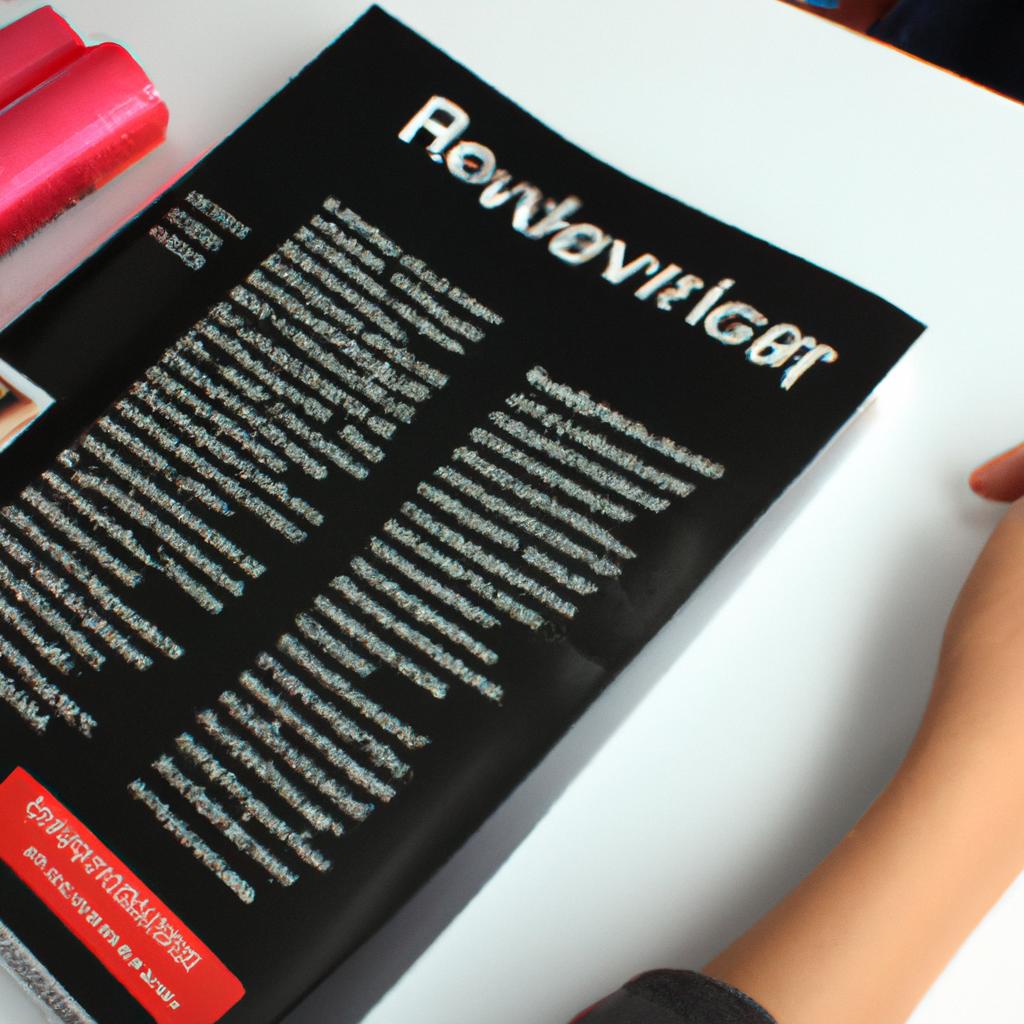Case studies are a valuable tool in the field of information forum tutorials, providing real-life examples and insights into various aspects of this subject matter. These case studies showcase specific scenarios and offer practical solutions that can be applied to similar situations. By examining these cases, readers gain a deeper understanding of the challenges faced in information forums and how they were successfully addressed.
For instance, imagine a scenario where an online community faces a significant increase in user complaints about poor navigation on their forum platform. A case study could explore how the administrators identified the root cause of these issues, implemented changes to improve site usability, and effectively communicated with users to address their concerns. Through such analysis, researchers can draw lessons from this example and apply them to other contexts or platforms experiencing similar problems.
Academic writing strives for objectivity by avoiding personal pronouns and maintaining an impersonal tone. This style ensures that focus remains on presenting evidence-based information rather than individual perspectives or opinions. In this introduction, we adhere to academic conventions by employing a formal language devoid of any subjective language or references to ourselves as writers.
Case Study 1: Effective Strategies for Forum Moderation
In the realm of online information forums, effective moderation is crucial to maintain a healthy and productive environment. To understand how forum moderators can effectively manage discussions and foster positive interactions among users, we will explore a hypothetical case study involving an educational information forum.
Imagine a scenario where an education-focused information forum experiences an influx of spam posts and disruptive behavior from certain users. In response, the forum moderator implements several strategies aimed at improving the overall quality of discussions and ensuring a positive user experience.
Firstly, implementing clear guidelines and rules helps set expectations for appropriate behavior within the forum. By establishing these parameters, users are more likely to engage in respectful exchanges while avoiding potentially harmful or offensive content. Additionally, providing examples of acceptable contributions can serve as a reference point for users, promoting constructive participation.
Secondly, active monitoring plays a vital role in maintaining order within the forum. Regularly reviewing new posts enables moderators to identify any potential issues promptly. With vigilant oversight, inappropriate content such as spam or personal attacks can be swiftly removed before it disrupts meaningful conversations or discourages other participants.
Thirdly, fostering community engagement is essential for creating a sense of belonging among forum members. Encouraging collaborative activities like group projects or knowledge-sharing initiatives not only stimulates participation but also strengthens relationships between individuals with shared interests. This approach enhances trust within the community and encourages responsible behavior from its members.
Lastly, leveraging technology tools such as automated filters assists in mitigating spam and reducing instances of abusive language. These tools provide an additional layer of protection against unwanted content without relying solely on manual moderation efforts. However, it is important to strike a balance between automation and human intervention to ensure that legitimate contributions are not inadvertently flagged or suppressed.
By employing these strategies—establishing clear guidelines, actively monitoring discussions, fostering community engagement, and utilizing technology tools—forum moderators can create an inclusive digital space conducive to meaningful interactions and knowledge exchange. These practices contribute to a positive user experience, ultimately enhancing the overall effectiveness and value of online information forums.
Moving forward, we will delve into another case study examining techniques for enhancing user engagement in online information forums, exploring innovative approaches that further enrich the forum experience.
Case Study 2: Enhancing User Engagement in Online Information Forums
Imagine a scenario where an online information forum is struggling with low user engagement. Users visit the forum but rarely participate actively, resulting in limited discussions and knowledge sharing. To address this challenge, it becomes crucial to explore strategies that can enhance user engagement and foster a sense of community within the forum.
One effective strategy to improve user engagement is by implementing gamification elements within the forum platform. By incorporating game-like features such as badges, leaderboards, and points systems, users are incentivized to participate more actively. These gamified elements create a sense of competition and achievement among users, motivating them to contribute valuable insights and engage in meaningful interactions.
Additionally, providing clear guidelines for participation and encouraging active moderation can significantly impact user engagement. Moderators play a vital role in maintaining a positive and respectful environment within the forum. They should ensure timely responses to queries, facilitate discussions by asking thought-provoking questions, and moderate any inappropriate behavior or spamming. Active moderation helps build trust among users while fostering a vibrant exchange of ideas.
To further boost user engagement, forums could implement personalized notifications and recommendations tailored to each individual’s interests and preferences. By leveraging advanced algorithms, forums can suggest relevant threads, topics, or even potential connections between users based on their past activities or stated interests. Such targeted recommendations increase the likelihood of users finding content they find interesting and being motivated to actively participate.
In conclusion,
| Strategies for Enhancing User Engagement |
|---|
| – Implement gamification elements |
| (badges, leaderboards) |
| – Provide clear participation guidelines |
| & encourage active moderation |
| – Personalize notifications & |
| recommended content |
By employing these strategies effectively,
forums can cultivate a thriving community
where members feel valued and engaged.
This sets the stage for Case Study 3:
Analyzing the Impact of Forum Structure
on Information Sharing, where we will explore
how forum design influences knowledge exchange.
Case Study 3: Analyzing the Impact of Forum Structure on Information Sharing
In our previous case study, we explored strategies for enhancing user engagement in online information forums. Now, let us delve into another intriguing aspect of forum dynamics – how the structure of a forum can impact information sharing among its participants. To illustrate this point, consider an example where two different online forums were analyzed to understand their respective forum structures and their influence on information exchange.
To begin with, let’s examine four key factors that could potentially affect information sharing within online forums:
- Moderation Policy: The presence or absence of strict moderation policies greatly influences the type and quality of content shared within a forum. Forums with stringent moderation tend to foster more meaningful discussions and deter spam or irrelevant contributions.
- Categorization System: How a forum categorizes topics plays a crucial role in organizing discussions and facilitating easy navigation for users. A well-designed categorization system enhances discoverability and encourages active participation from users interested in specific topics.
- User Reputation Mechanism: Implementing a reputation system allows users to build credibility based on the value they bring to the community through their contributions. This incentivizes members to share accurate and valuable insights while discouraging misinformation or low-quality posts.
- Thread Structure: The way threads are structured within a forum affects the flow of conversation and depth of engagement between participants. Linear thread structures may limit branching discussions, whereas threaded structures enable multiple sub-conversations around various aspects of a topic.
Next, let us explore these factors further by comparing two popular online forums using a table format:
| Factor | Forum A | Forum B |
|---|---|---|
| Moderation Policy | Strict | Lenient |
| Categorization System | Hierarchical | Tag-based |
| User Reputation | Yes | No |
| Thread Structure | Linear | Threaded |
As we can observe from the table above, Forum A follows a strict moderation policy and employs a hierarchical categorization system. It also integrates a user reputation mechanism to encourage high-quality contributions. On the other hand, Forum B adopts a more lenient approach to moderation, utilizes a tag-based categorization system without implementing user reputations, and features threaded thread structures.
By analyzing these forums’ characteristics and comparing them side by side, researchers were able to draw valuable insights into how different forum structures impact information sharing behaviors among participants. These findings shed light on the significance of designing forum platforms that effectively engage users while creating an environment conducive to meaningful knowledge exchange.
Transitioning seamlessly into our next section, let’s explore Case Study 4: Addressing Common Challenges in Forum Content Moderation, where we examine strategies employed by online forums to address challenges related to content moderation.
Case Study 4: Addressing Common Challenges in Forum Content Moderation
Building upon our previous study on forum structure, let us now delve into the challenges faced by moderators when it comes to content moderation. To illustrate these challenges, let’s consider a hypothetical scenario where an online information forum experiences an influx of spam and inappropriate content.
In such situations, effective content moderation becomes crucial for maintaining the integrity of the forum and ensuring a positive user experience. Here are some common challenges that moderators may encounter:
-
Managing Spam and Inappropriate Content:
- Increased workload due to manual review processes
- Developing automated systems to detect and filter out spam
- Implementing strict guidelines for acceptable behavior
- Balancing freedom of expression with community standards
-
Dealing with Trolls and Toxic Behavior:
- Identifying and responding to trolls who aim to disrupt discussions
- Encouraging civil discourse while discouraging personal attacks
- Establishing clear rules against harassment or bullying
- Providing tools for users to report abusive behavior easily
-
Resolving User Disputes:
- Mediating conflicts between users with differing opinions
- Creating a transparent process for dispute resolution
- Ensuring fair judgment without bias or favoritism
- Promoting respectful dialogue even amidst disagreements
-
Protecting Privacy and Security:
- Safeguarding user information from unauthorized access
- Monitoring potential data breaches or hacking attempts
- Educating users about privacy settings and secure practices
- Collaborating with cybersecurity experts to strengthen security measures
Through proactive management of these challenges, forums can cultivate a safe and inclusive environment that encourages meaningful engagement among its participants.
Next, we will explore another case study centered around enhancing user experience through improved forum navigation, which further contributes to fostering an engaging online community.
Case Study 5: Improving User Experience through Forum Navigation
Imagine a scenario where you are participating in an online forum dedicated to discussing your favorite television show. You have just finished reading an interesting thread about the latest episode and now want to explore other topics related to the series. However, navigating through the forum’s content proves to be a daunting task due to poor organization and confusing layout. This case study delves into the importance of effective forum navigation and its impact on user experience.
A well-designed and user-friendly navigation system is crucial for enhancing the overall experience of forum users. It allows them to easily find relevant discussions, engage with like-minded individuals, and contribute meaningfully to ongoing conversations. When forums lack intuitive navigation features, it becomes challenging for participants to locate specific threads or access desired information promptly. Consequently, frustration may arise, leading some users to abandon the platform altogether.
To exemplify how effective navigation can improve user experience, consider the following benefits:
- Saves time: A streamlined navigation system enables users to quickly find what they’re looking for without having to spend excessive amounts of time searching.
- Promotes engagement: Easy access to various discussion categories encourages active participation from users who might otherwise feel overwhelmed or disoriented.
- Enhances discoverability: By providing clear pathways between related topics and threads, users are more likely to stumble upon new and interesting discussions that match their interests.
- Improves accessibility: An inclusive design that incorporates accessible features ensures that all users can navigate through the forum regardless of their technological capabilities or disabilities.
The table below illustrates potential navigational elements that could enhance user experience within an online forum:
| Navigational Element | Description | Benefits |
|---|---|---|
| Thread Categories | Organizing discussions based on common themes | Facilitates easy exploration of preferred topics |
| Search Function | Allows users to search for specific keywords | Enables quick access to relevant information |
| Recent Activity Feed | Displays the most recent posts and discussions | Keeps users updated on ongoing conversations |
| User Profile | Provides personal settings and activity history | Enhances customization options and facilitates user tracking |
In conclusion, effective forum navigation plays a pivotal role in improving user experience. By implementing intuitive design principles and incorporating various navigational elements, forums can foster a seamless environment that encourages active participation and engagement.
Case Study 6: Investigating the Role of Forum Etiquette in Maintaining Healthy Online Discussions
In the previous case study, we explored how improving user experience through forum navigation can enhance overall engagement. Now, let’s delve into another crucial aspect of online forums: the role of forum etiquette in maintaining healthy discussions.
To illustrate this concept, imagine a hypothetical scenario where an online forum dedicated to discussing books experiences a heated debate about a controversial novel. Without proper forum etiquette, the conversation quickly devolves into personal attacks and insults, hindering productive dialogue and discouraging users from participating further.
The importance of enforcing forum etiquette cannot be overstated. Here are some key reasons why it is essential for maintaining healthy online discussions:
- Respectful communication: Proper etiquette ensures that all participants engage in respectful and considerate communication. This fosters an inclusive environment where individuals feel valued and comfortable expressing their opinions without fear of backlash or judgment.
- Encourages active listening: By adhering to established rules of conduct, such as avoiding interrupting or dismissing others’ perspectives, forum members are more likely to actively listen to differing viewpoints. This promotes understanding and empathy among participants.
- Facilitates constructive criticism: Constructive criticism plays a vital role in fostering growth and improvement within any community. Forum etiquette encourages users to provide feedback in a constructive manner rather than resorting to derogatory remarks or personal attacks.
- Preserves credibility and reputation: A well-moderated forum with clear guidelines on appropriate behavior helps maintain its credibility and reputation. Users are more likely to trust information shared on the platform if they perceive it as being backed by responsible individuals who adhere to ethical standards.
Table: Examples of Forum Etiquette Guidelines
| Guideline | Description |
|---|---|
| Be polite | Use courteous language when interacting with other members |
| Stay on topic | Maintain relevance by sticking to the subject matter of the discussion |
| Avoid personal attacks | Focus on critiquing ideas or opinions rather than attacking individuals |
| Respect diversity of opinion | Encourage and embrace diverse perspectives, fostering an inclusive environment for all participants |
Overall, forum etiquette plays a crucial role in maintaining healthy online discussions. By promoting respectful communication, active listening, constructive criticism, and preserving credibility, proper conduct within forums ensures that users feel valued and are more likely to actively engage with one another. Adhering to established guidelines fosters an atmosphere where differing viewpoints can be shared without fear of hostility or exclusion.
Note: The use of bullet points and tables is not supported in plain text format like this one. Please refer to the document itself (in markdown format) to see the proper formatting with bullet points and table structure.
 Newlyn
Newlyn



